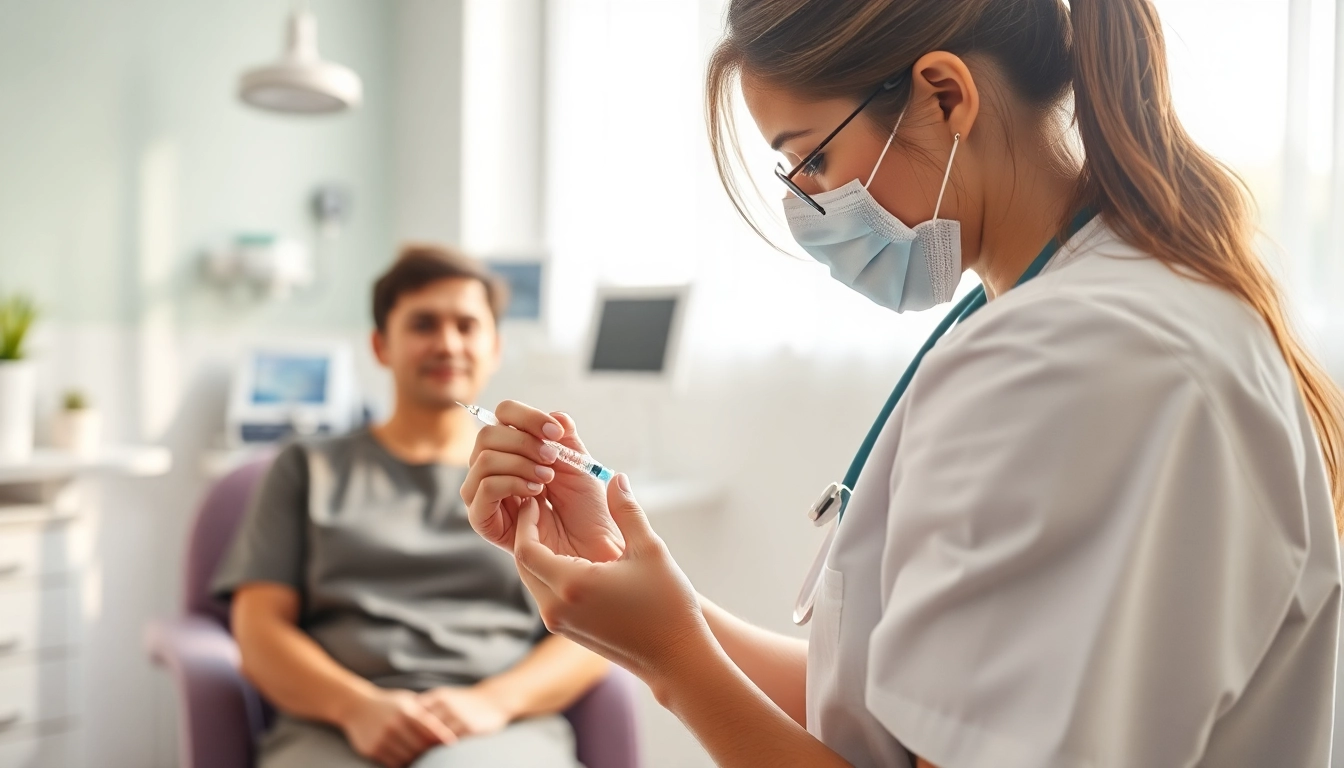Understanding Biotin Injection
What is Biotin Injection?
Biotin injection refers to an injectable form of vitamin B7, a crucial water-soluble vitamin that plays a significant role in numerous bodily functions. Biotin is essential for converting food into energy and is known for its beneficial effects on skin, hair, and nails. While biotin can be obtained through dietary sources such as eggs, nuts, and whole grains, an injection can provide a more concentrated dose, often prescribed when individuals have a deficiency or require enhanced benefits for specific health goals. Some people opt for regular biotin injection treatments to promote overall well-being.
Benefits of Biotin Injection
The advantages of biotin injection extend beyond just improving hair, skin, and nails. Some notable benefits include:
- Enhanced Hair Growth: Biotin is well-regarded for combating hair loss and stimulating hair follicles, leading to thicker and healthier hair.
- Improved Skin Health: Regular biotin injections can help maintain skin elasticity and hydration, reducing the likelihood of dryness and flakiness.
- Nail Strengthening: Biotin is associated with strengthening brittle nails, making them less prone to breakage and enhancing their overall appearance.
- Boosted Energy Levels: By aiding in the metabolism of carbohydrates, fats, and proteins, biotin helps improve energy levels and alleviate feelings of fatigue.
- Support for Metabolic Function: Biotin contributes to metabolic processes, thereby playing a role in maintaining a healthy weight and supporting optimal bodily function.
Who Qualifies for Biotin Injection?
Biotin injections may be beneficial for various individuals, especially those who:
- Are deficient in biotin due to dietary restrictions or absorption issues.
- Suffer from hair thinning or hair loss caused by stress, hormonal changes, or medical conditions.
- Are experiencing skin problems like dryness or flakiness.
- Have brittle nails and wish to enhance their overall nail health.
- Seek to improve their energy levels and enhance metabolic function.
Before starting biotin injections, a consultation with a healthcare provider is essential to determine suitability.
The Science Behind Biotin Injection
How Biotin Works in the Body
Biotin plays a pivotal role as a coenzyme in the metabolism of fatty acids, amino acids, and glucose. By facilitating the conversion of food into energy, biotin ensures that the body can utilize nutrients efficiently. It also helps maintain healthy skin by supporting the production of fatty acids that nourish the skin and keep it moisturized. Furthermore, biotin contributes to carbohydrate metabolism, making it essential for maintaining blood sugar levels, which can be particularly beneficial for individuals with insulin resistance.
Common Myths About Biotin Injection
Despite the popularity of biotin injections, several misconceptions persist:
- Myth 1: Biotin injections can replace a balanced diet.
Fact: While injections can boost biotin levels, they should not be seen as a substitute for a nutritious diet rich in all essential vitamins and minerals. - Myth 2: All biotin is absorbed equally, regardless of the method of intake.
Fact: The body may absorb nutrients more effectively when administered via injection, especially in individuals with absorption issues. - Myth 3: Biotin causes rapid hair growth overnight.
Fact: While biotin supports hair growth, significant results typically take time, and consistent use may be required.
Research Supporting Biotin Injection Benefits
Numerous studies have demonstrated the efficacy of biotin in promoting hair, skin, and nail health. Research indicates that biotin supplementation can significantly improve the thickness of hair in those experiencing hair loss. Moreover, clinical trials have shown that biotin can effectively strengthen nails by preventing them from becoming brittle and breaking easily. As more research continues to emerge, the potential benefits of biotin injections are becoming increasingly recognized within the medical community.
Choosing the Right Provider for Biotin Injection
Factors to Consider Before Getting Biotin Injection
Selecting a qualified healthcare provider for biotin injection is crucial for ensuring safety and effectiveness. Consider the following factors:
- Qualifications: Ensure that the provider is licensed, certified, and has experience administering vitamin injections.
- Facility Standards: Choose a clinic that adheres to strict cleanliness and safety protocols.
- Personalized Care: Look for providers who assess individual health goals and customize treatment plans accordingly.
- Patient Reviews: Research feedback from previous patients to gauge the provider’s reputation and patient satisfaction.
Questions to Ask Your Healthcare Provider
Prior to receiving a biotin injection, consider asking your healthcare provider the following questions:
- What are the expected benefits of biotin injection for my specific condition?
- How often should I receive injections for optimal results?
- What are the potential side effects or risks associated with biotin injections?
- Can you describe the procedure and what I should expect during the appointment?
- How will we measure the effectiveness of the treatment?
The Importance of Certified Administration of Biotin Injection
Receiving a biotin injection from a certified professional is essential for several reasons. First, it guarantees that the injection is administered in a sterile environment, minimizing the risk of infections or complications. Second, certified providers have the training necessary to understand individual needs and can monitor for any adverse effects during the procedure. Lastly, professional administration helps ensure proper dosage, which is crucial for maximizing the treatment’s effectiveness.
Preparing for Biotin Injection
Steps to Take Before Your Biotin Injection
Preparation is key to ensuring a successful biotin injection. Here are some steps you should follow:
- Medical Consultation: Schedule a consultation with your healthcare provider to discuss your health history and any conditions that may affect treatment.
- Inform About Allergies: Notify your provider of any allergies to medications or materials that may be used during the injection.
- Dietary Considerations: While biotin injections can provide benefits, maintain a balanced diet to support overall health.
- Hydration: Ensure adequate hydration leading up to the appointment, as this can help with the overall procedure experience.
What to Expect During the Biotin Injection
During the administration of the biotin injection, you can expect the following:
- The healthcare provider will cleanse the injection site with an antiseptic to reduce the risk of infection.
- A small gauge needle will be used to administer the biotin solution intramuscularly or subcutaneously.
- Most patients report minimal discomfort during the injection, with some experiencing only mild pressure.
- The entire process typically takes just a few minutes.
Aftercare Following a Biotin Injection
Post-injection care is essential for promoting healing and ensuring optimal results. Consider the following aftercare tips:
- Avoid strenuous exercise or activities that could stress the injection site for 24 hours.
- Keep the injection area clean and dry, and avoid heavy scrubbing.
- Monitor for any unusual side effects or reactions, such as swelling or redness at the site.
- Adhere to any additional instructions provided by your healthcare provider.
Measuring the Effectiveness of Biotin Injection
Post-Treatment Expectations After Biotin Injection
Following a biotin injection, it’s important to set reasonable expectations regarding results. Some may notice immediate improvements in energy levels, while others may require a few weeks to observe significant changes in hair, skin, or nails. Regular follow-up appointments with your healthcare provider can assist in evaluating your progress and making necessary adjustments to your treatment plan.
Signs of Improvement After Biotin Injection
Several signs indicate that the biotin injection is positively affecting your body:
- Hair may begin to grow thicker and stronger over time, with reduced shedding.
- Skin may appear more radiant and hydrated, with a noticeable reduction in dryness.
- Nails may become stronger and less prone to breakage.
- Increased energy levels may be felt, alleviating feelings of fatigue.
When to Consult Your Provider After Biotin Injection
It’s crucial to stay in touch with your healthcare provider following a biotin injection. Seek advice if you experience:
- Severe swelling, redness, or pain at the injection site.
- Unusual symptoms such as rashes or allergic reactions.
- Little to no observable improvement after several weeks of treatment.
- The emergence of new or worsening symptoms that concern you.
Open communication with your provider will help ensure that your treatment journey is both effective and safe.



